Certain SaaS platforms are synonymous with powerful work management capabilities, and one such name is Monday.com. This project management software launched in 2014 has grown immensely from the time of its conception. Today, it sees revenue growth of nearly 75% in a quarter generating revenues as high as $120+ million. But like we always say, such exemplary growth has to be supported by excellent content marketing. Our content marketing case study this time around focuses on the Monday.com content marketing strategy that drove phenomenal growth for the brand with the power of data and incremental improvement.
Monday.com content marketing strategy
- Monday.com blog
- Product updates, workdocs, and templates
- Guides and thought leadership content
- Internal linking
- Leveraging the power of data with BigBrain
- Monday on social media
- Monday on YouTube
- Global events and subway ads as part of Monday.com marketing strategy
- What we learned from the Monday.com content marketing case study

About Monday.com
Monday.com is a popular Work OS (operating system). It works as a centralized work management tool that brings teams together to collaborate with full transparency. This means Monday.com’s target audience is teams that need to work on projects together, brainstorm, share information, track progress, and deliver. This includes both in-office and distributed/remote teams, for whom the need for a solid collaboration platform is even more.
Monday.com is used by Marketing, Sales, Operations, HR, IT, and other teams in enterprises and small businesses.
TL;DR here’s a quick video summarizing this content marketing case study.
Monday.com content marketing strategy
Like most successful SaaS companies, Monday.com also understood the importance of effective content marketing early on in their journey. From the very beginning, Monday.com has focused on all the commonly used content marketing channels like social media, SEO content for blogs, and their website. But over the past few years, the company has also started running other brand awareness campaigns outside of these domains.
In this content marketing case study we will look at all these aspects of Monday.com’s content marketing strategy, trying to understand what it takes to woo a B2B audience and drive growth.
Monday.com blog
Something we’ve seen in all our case studies so far, be it the HubSpot content marketing case study, the one on the ClickUp content marketing strategy, or others, is audience segmentation. Categorization of content on the blog helps target the right prospects and makes the content more accessible to them. The Monday.com blog is also extremely well-segmented and categorized.
When you land on the blog home page, you will see three drop-down menus at the top – Industries, Product, and Work Your Way. ‘Industries’ categorizes the blog content based on the different verticals it targets such as Marketing, Sales and CRM, Project Management, Software Development, etc. Similarly, ‘Work Your Way’ categorizes the content based on the different use cases of Monday.com.
Apart from this, another thing that catches your eye on the blog home page is the ‘Editor’s Pick’ section. Monday.com always lists some of its best-performing or most authoritative blog posts under this section. This is a great way to get more traction on these posts and help them rank higher in search, supporting an already great SEO content strategy.
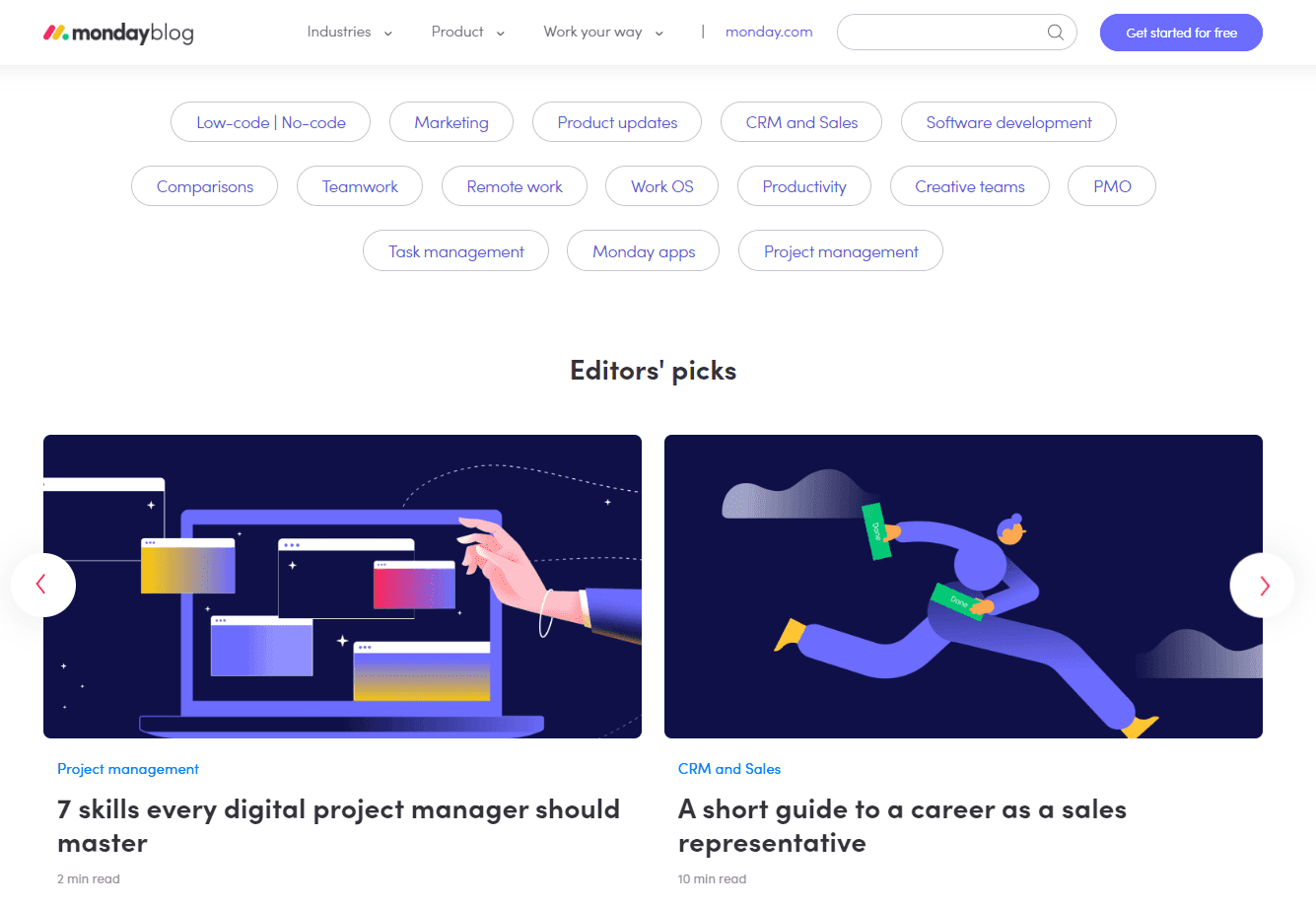
Coming to blog posts, Monday.com also posts a lot of educational and informational articles similar to the other popular SaaS companies we’ve studied. Similar to the product-led content marketing technique observed in the Marketo content marketing case study, there are some very basic blog posts that answer the audience’s simplest questions, while also showing how to achieve the solution using Monday.com. Here’s an example from the blog post titled What’s a sales process flowchart, and why do you need one?
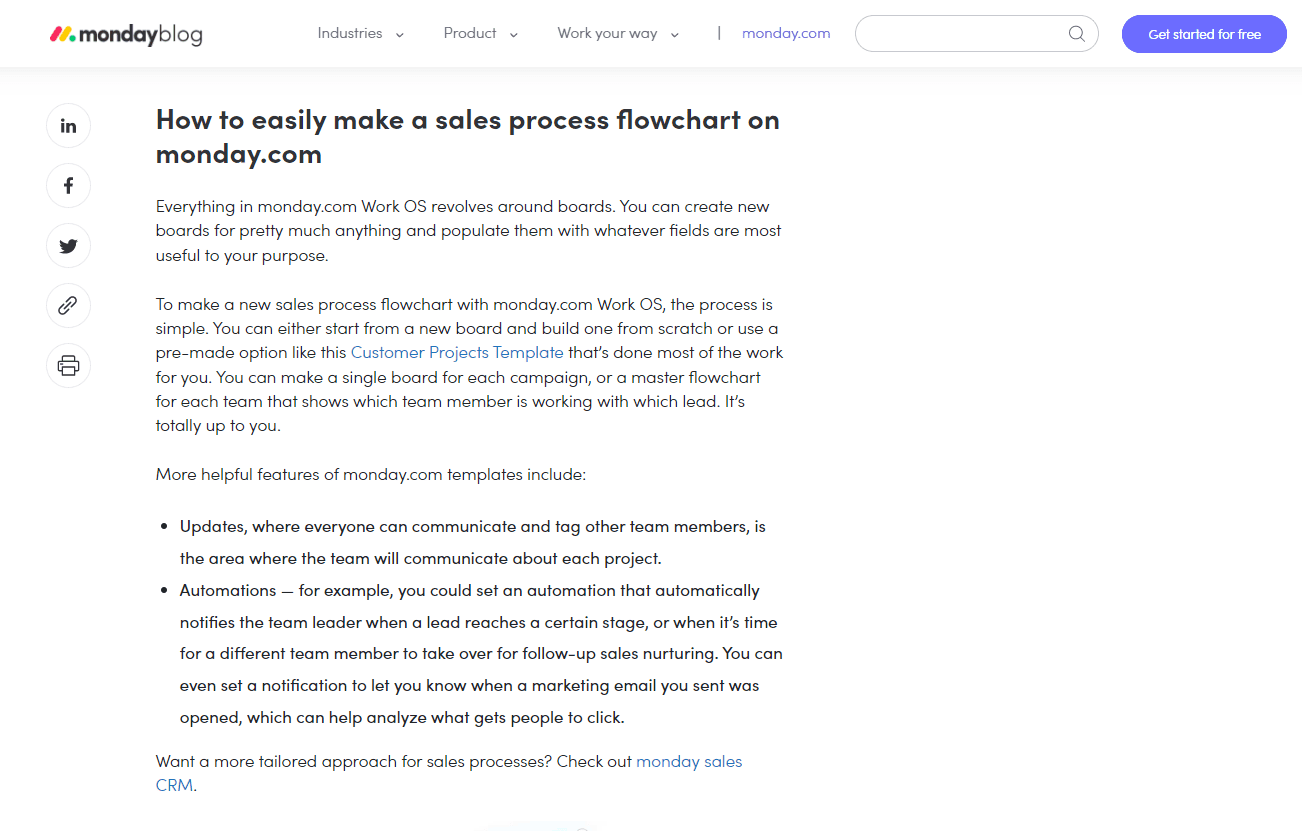
If you’re familiar with product-led content marketing, you must have understood by now what the SaaS company is trying to achieve with this strategy. By making a reader aware of their challenges and then offering a solution that can be implemented using this product, Monday.com is building a case for itself. It encourages readers to try out the solution and experience the project management software firsthand. If they like it, they might even consider purchasing it or may at least help with word-of-mouth marketing. This is what product-led marketing aims at, something we’ve seen in Notion’s content marketing strategy as well as the others.
Product updates, workdocs, and templates
Another very effective way Monday.com is building brand awareness and helping users discover new use cases for the product is by creating content around product updates. The Monday.com blog has a dedicated Product section that shares product updates, content about Monday apps and workdocs, and news around the Work OS.
These articles talk exclusively about the problems that Monday products can solve. For instance, the entire category of Monday workdocs talks about how you can address document management or knowledge management pain points in your organization using Monday workdocs. The topics of these articles may still be educational, such as this example that shares a complete guide on Knowledge Management Software, but the narrative revolves around their own product.
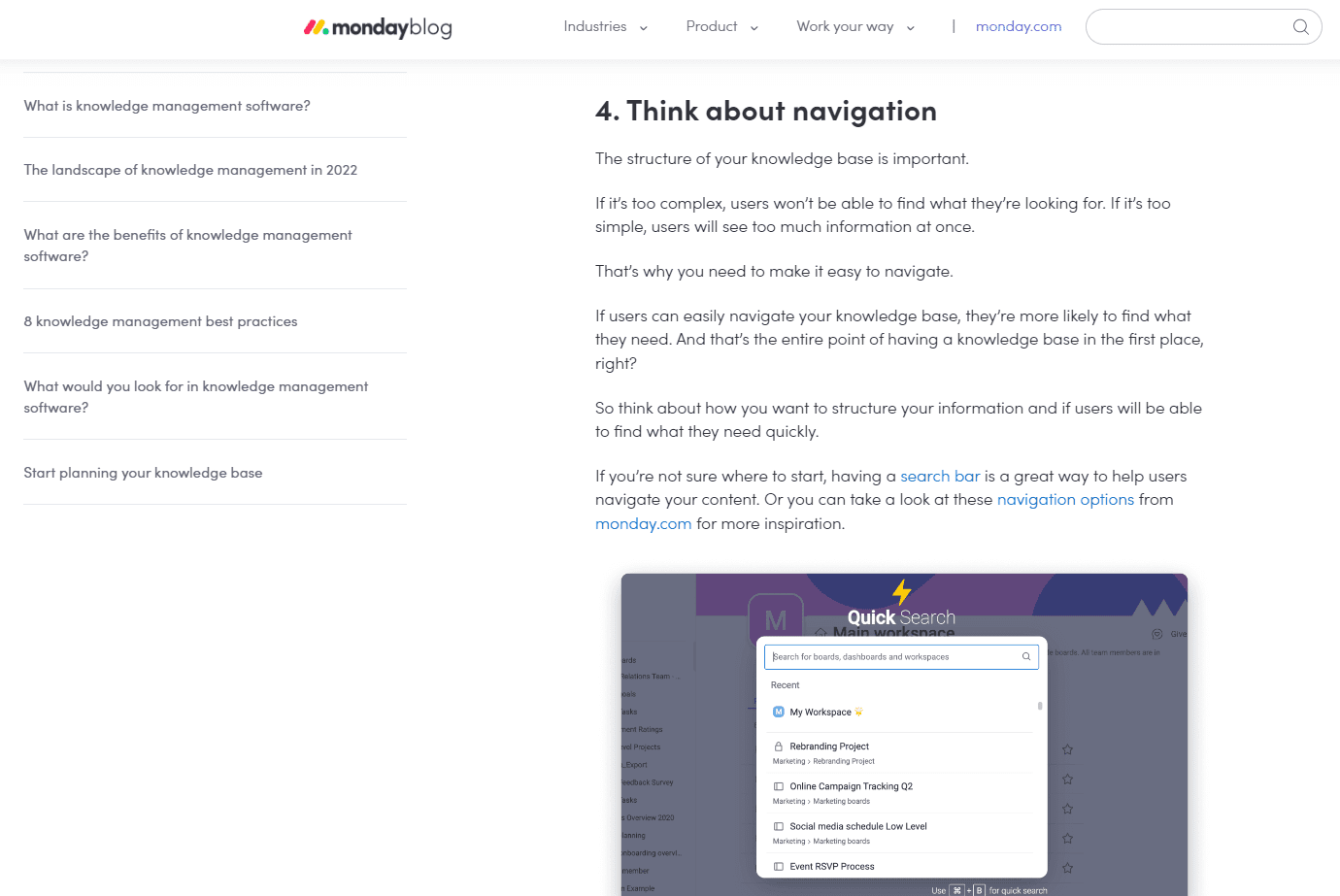
Monday.com also shares a lot of templates within their content. This is something we’ve noticed in our Airtable content marketing case study too, and the same tactic is used by Notion and others. Prospective users often search for templates for project management, invoicing, timesheets, etc. Creating content with templates and examples allows Monday.com to rank for these keywords and thus increase visibility for their brand.
Guides and thought leadership content
Detailed guides are a great way to win your audience’s trust and build authority for your blog. Monday.com seems to understand this well and publishes tons of guides for their different audience segments. From beginner’s guides on project management to inventory management guides for e-commerce businesses, Monday makes sure that if their audience wants a rich article on any topic they find it on the Monday blog.

This translation of the Scrum Guide, for instance, discusses everything there is to know about the Scrum framework. It presents all the key takeaways from the official Scrum Guide in plain language, making it easy for everyone to understand which can be extremely valuable to anyone new to project management
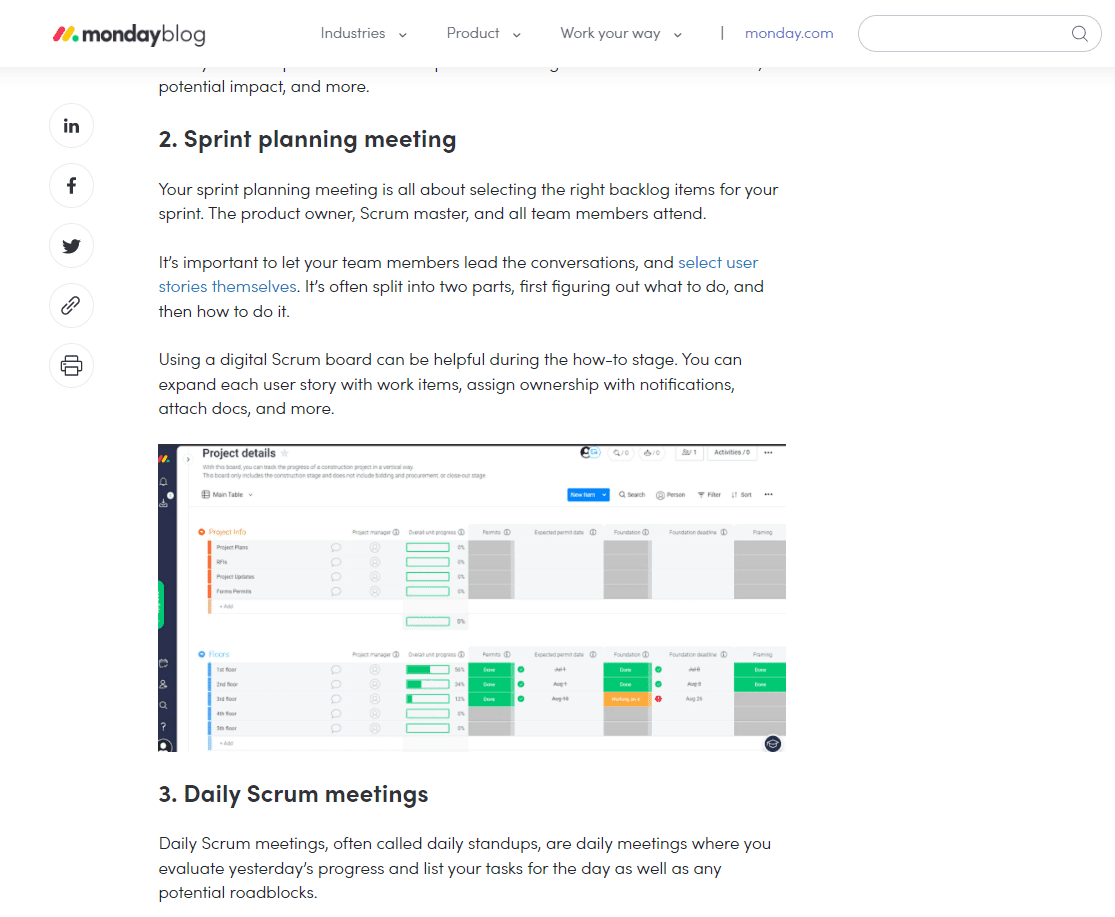
But that’s not all a detailed guide helps with. It also allows Monday to weave its products into the story without making it seem too obvious. Since they are already discussing a step-by-step procedure or a framework, they can demonstrate examples using their own tools as seen in the image above. This allows prospects to get a feel of what the product can do for them, generating more awareness.

Internal linking
To build authority for your content, backlinks are critical. While getting backlinks from external sources is an effort-intensive task, internal linking is not but it is equally important for your domain authority. Monday.com leverages internal linking to the fullest.
Every article on the Monday blog has tons of internal links to other articles on the blog, their website pages, templates, etc. Such heavy internal linking on your content can serve two very crucial purposes. Firstly, it directs your visitors to other valuable content pieces on your blog. If there are some MOFU/BOFU pieces on the blog, linking out to them from a TOFU blog post may accelerate the buyer’s journey through the funnel.
Secondly, it passes on the authority from one blog post to another. So, if you are linking out to your new posts from an existing high-authority, high-performing post, search engines like Google will see these new posts as valuable too. Internal linking also signals to search engines that your site is an authority on the topic/niche.
By amply linking across their blog posts, Monday is making the best of this digital marketing tactic. Monday.com has also built a lot of external backlinks as is evident from this Ubersuggest data. All of these internal and external backlinks have contributed to building Monday.com’s domain authority to a solid 70.
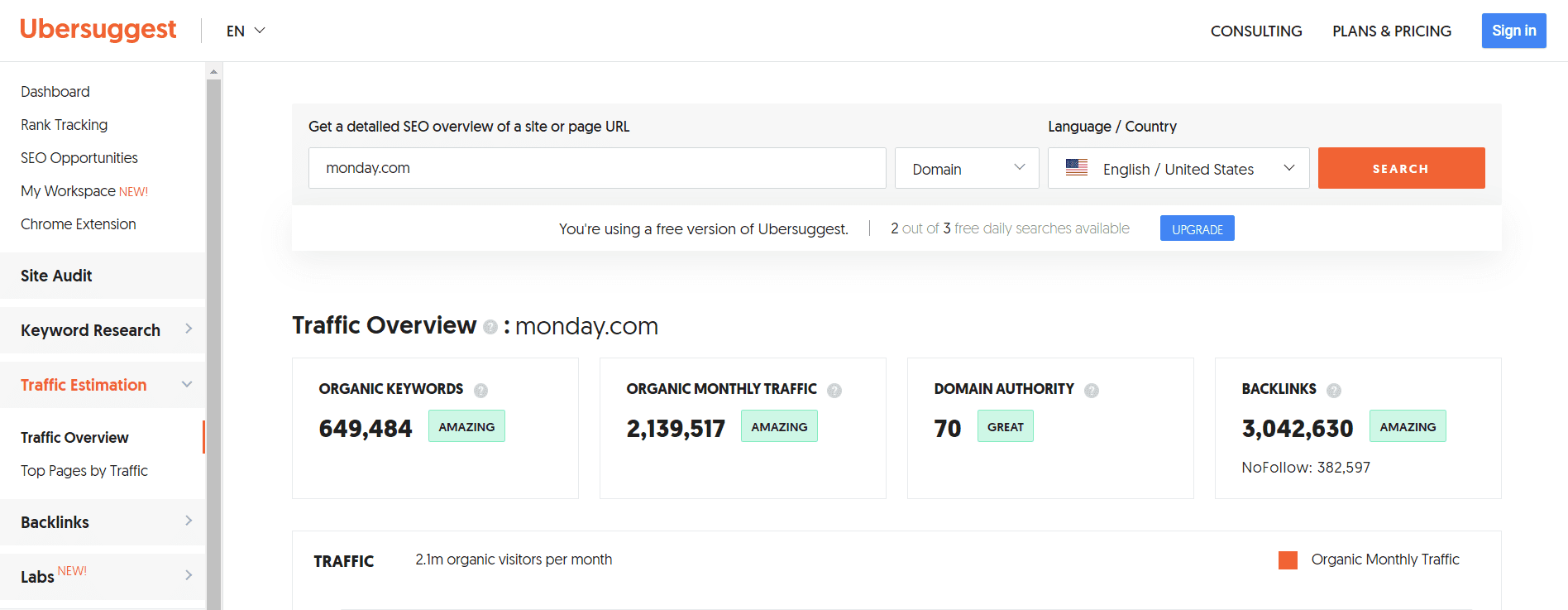
Leveraging the power of data with BigBrain
Data-driven marketing is extremely powerful. Knowing what the customer wants or how the customer makes a purchase decision or what your competitors are up to can be a game-changer for content marketers. Monday.com content marketing strategies are built on the foundation of strong business intelligence. So much so, that they’ve even built their own BI platform – BigBrain.
BigBrain is their single source of truth where all their data is centrally stored. So no matter whether they’re looking to track their marketing campaigns or gather customer data, all the content marketers at Monday have to do is refer to their in-house BI tool.
In an interview with DCMN, Aviv Bar Oz, Brand Marketing Professional Lead at Monday.com, also mentioned that they often conduct brand awareness surveys with individual users to learn how they found out about the SaaS brand. This gives them more insights into which channels and which media are working best for their brand, where to run campaigns for better reach, and which markets to target more.
With data-driven digital marketing strategies, the content and SEO team has a better shot at continuously improving and optimizing their campaigns to drive business growth.
Monday on social media
As with most known SaaS companies, Monday has a presence on all the major social media platforms too. Monday.com’s content on LinkedIn and Twitter is very conversational and relatable. They often post questions for their audience and encourage discussions. Sometimes, they post relatable stories or a short poem that their audience (project managers, marketers, sales professionals, etc.) would connect instantly with. There are also a lot of productivity tips, mental health and well-being tips, and work culture related posts – perfect for LinkedIn as it is a professional networking site.
Here’s an example of a thoughtful post they put out a while ago.
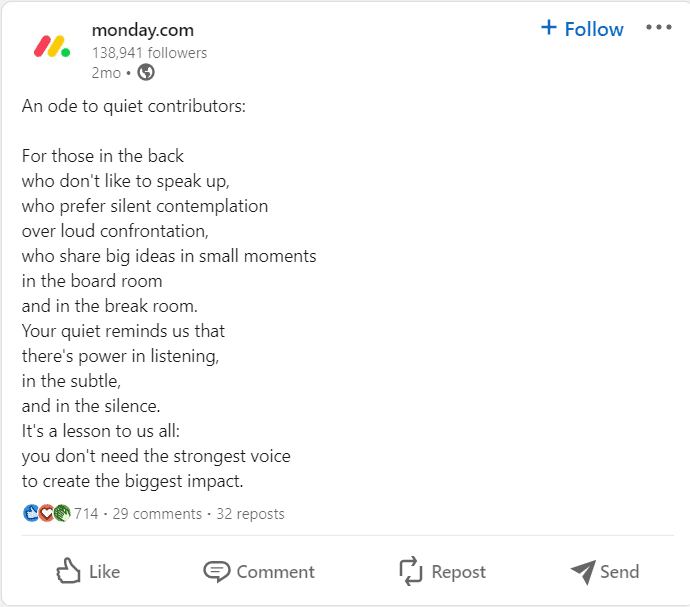
This is a great way to build relationships and trust with the audience who want brands to understand their needs, challenges, and motivations.
But that’s not all. Monday.com also promotes many events, interviews with industry thought leaders, and product updates. This is their way of keeping their followers in the loop about everything that the company is doing and building more brand awareness.
We also noticed that the content they post on Twitter, LinkedIn, and Instagram is not always the same, unlike many other brands. On Instagram, for instance, you’ll find more memes and trending posts since it is an image-first platform.

Monday.com’s content marketing strategy on social accounts for the fact that some posts work well on one platform but not necessarily on another. Putting in the effort to create different content for different social media channels now and then helps them reach a more diverse audience base.
Monday on YouTube
The Monday.com content strategy on YouTube is all about educating the audience. Most of their videos on the YouTube channel are tutorials, quick tips, webinars, or user guides. We’ve also noticed a lot of multilingual content on the Monday YouTube channel, that caters to their global audience.
The ads that Monday creates are also pretty unique. Every video ad shows a different use case of the platform. For instance, one short commercial talks about how you can automate work with Monday’s Sales CRM while another talks about how your entire marketing team can work on one platform. The company has run a few interesting video ad campaigns too, like the Work Genie and the Big Game commercials that are fun to watch.
Global events and subway ads as part of Monday.com marketing strategy
Monday.com’s content marketing strategy is not just limited to owned media platforms or web content. They are making the best they can of advertising in public places, hosting and participating in events, and more. The website has a dedicated Global events hub that lists all the events Monday.com is a part of. This includes their own webinars, the Elevate Show hosted by Monday.com, and other events where they present content and deliver talks.
Similar to ClickUp, Monday also advertises on billboards and even on the New York subway. The Big Game campaign by Monday was, indeed, created as their debut Superbowl commercial.
Though a media strategy like this is more common in B2C marketing, many SaaS brands are now implementing this in B2B marketing as well. The idea is that targeting individual users can help them introduce the product to more people. Individuals who find out about the product will take it to their team members, thus helping with lead generation over and above organic leads from inbound marketing. A model that SaaS tools like Canva have benefitted tremendously from.
What we learned from the Monday.com content marketing case study
SaaS content marketing is an evolving area and all successful SaaS brands are constantly experimenting with their content strategies. Some strategies work wonders while others need to be improved. Monday.com is no different. They’ve had their share of hits and misses, but over time they’ve carved a niche for the brand. Some of the key takeaways from this content marketing case study on Monday.com would be the following:
- Content production is time-consuming, but if you put the effort into developing engaging content tailored to your audience’s needs and preferences, you could see tremendous growth.
- Audience segmentation and content categorization are the mantras to blogging success, as seen with most popular SaaS brands.
- Product-led content is the hero of SaaS content marketing. Be it ClickUp, Monday.com, or Notion, they’ve all seen value in it.
- Extensive internal and external linking can do wonders for your content’s SEO, building authority for your blog and website.
- Data-driven content marketing helps you optimize your content marketing campaigns with crucial market and customer information.
Looking for an alternative to Monday.com for your content team?
Monday.com is great as a Work OS for most teams, but when it comes to managing your content operations, you need solutions tailored for the unique needs of content marketers. Content teams need a single platform where they can plan, create, optimize, and publish their content, and tools like Monday.com will only help you with a small part of this.
A great Monday.com alternative for content marketing is Narrato. Narrato helps teams manage their content process end-to-end in one place with features like SEO content briefs, AI writing assistant, AI content optimization, WordPress publishing support, Zapier integrations, and more. Give Narrato a try today!




